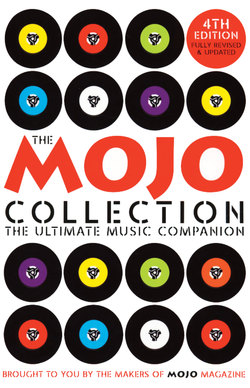Читать книгу The Mojo Collection - Various Mojo Magazine - Страница 98
На сайте Литреса книга снята с продажи.
Country Joe And The Fish Electric Music For The Mind And Body Pioneers of psychedelic-protest mix acid and satire.
ОглавлениеRecord label: Vanguard
Produced: Samuel Charters
Recorded: Sierra Sound Laboratories, California; January–February 1967
Released: October 1967 (UK) May 1967 (US)
Chart peaks: None (UK) 39 (US)
Personnel: Joe McDonald (v, g, hm, tambourine); Barry Melton (v, g); David Cohen (g, o); Bruce Barthol (b, hm); Gary ‘Chicken’ Hirsch (d); Bob DeSousa (e)
Track listing: Flying High; Not So Sweet Martha Lorraine; Death Sound Blues; Happiness Is A Porpoise Mouth; Section 43; Superbird; Sad And Lonely Times; Love; Bass Strings; The Masked Marauder; Grace
Running time: 43.30
Current CD: Vanguard VMD79244
Further listening: Try I-Feel-Like-I’m-Fixin’-To-Die (1967) for more of the same, albeit with a little more bad-trip darkness
Further reading: www.countryjoe.com (official); www.well.com/~cjfish/ (fan site)
Download: Not currently legally available
Electric Music For The Mind And Body certainly sounds like an 11-song panegyric for LSD but, unusually for 1967, it also acknowledged the real world of Vietnam-era politics. That was largely due to activist/frontman Country Joe McDonald, who’d formed the group in 1965 to play jugband protest songs to Berkeley University beatniks. One, I-Feel-Like-I’m-Fixin’-To-Die-Rag, later became the counter-culture’s key anti-war anthem, eclipsing the band’s psychedelic reputation in the process.
A druggy mid-1966 EP, Rag Baby, enjoyed considerable success in and around San Francisco and later that year the Fish were signed to Vanguard.
‘In many ways, Electric Music is fairly unrepresentative of what the band actually sounded like in concert,’ says Barry Melton. ‘When we played live, the amps had a typical overdriven sound that was much more rock’n’roll-ish. But (engineer) Bob DeSousa insisted we turn the amps down very low so that he could maintain separation between the instruments and balance them.’ The result was far more polished and rehearsed than the Fish had intended, but in spring 1967, Electric Music – dressed in one of the era’s more evocative sleeves – was still way ahead of the competition. Taut, psychedelicised R&B (Flying High, Love) and waltz-time craziness (Porpoise Mouth, The Masked Marauder), were complemented by some extraordinary acid-rock excursions (Bass Strings, Section 43 and Grace), where Melton’s highly-strung guitar, Cohen’s asthmatic Farfisa and Joe’s stoner vocals detonated over dreamlike, mock-Eastern rhythms. There was satire here too (Superbird, Flying High), but essentially Electric Music was about the politics of mind-altering drugs.
‘It’s hard to say who was right in the end,’ says the guitarist. ‘Bob may have come up with a more artistic recording, and cleaned us up enough to be commercial. But maybe we were cleaned up so much that we never had the smash success with our records that we had on stage.’ That said, Electric Music was a consistent seller throughout the Summer Of Love, and remains one of the few truly successful US psychedelic albums.
